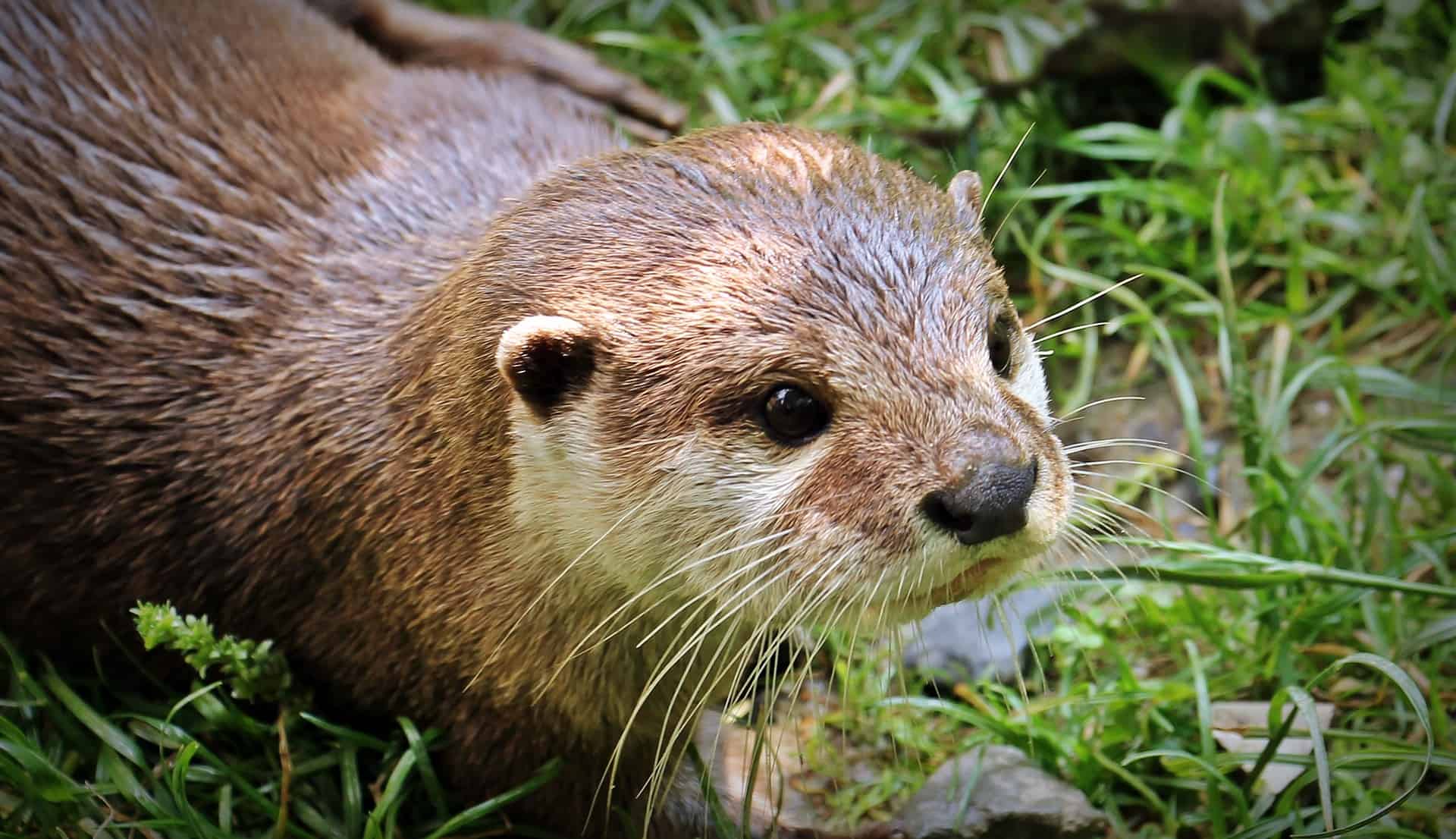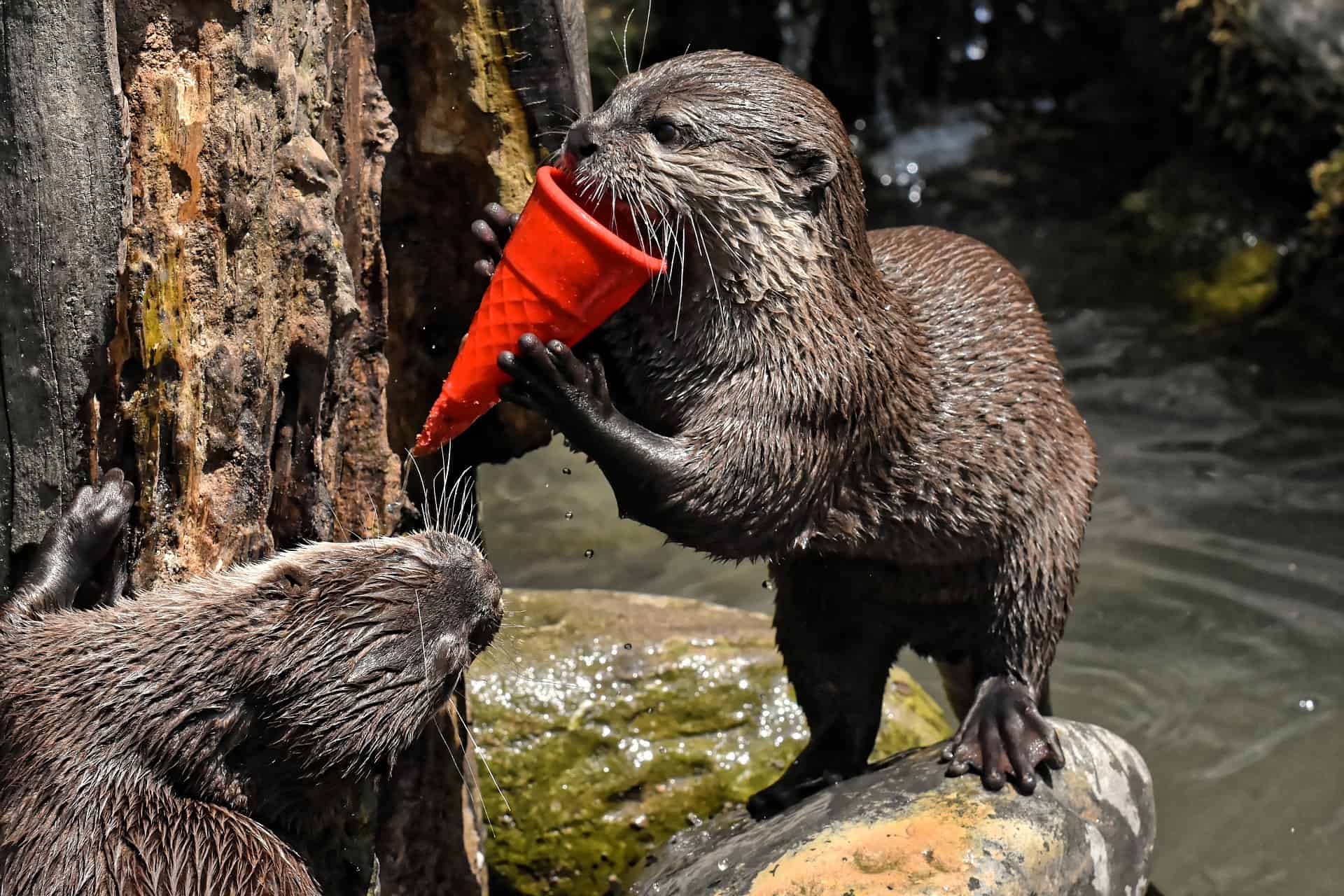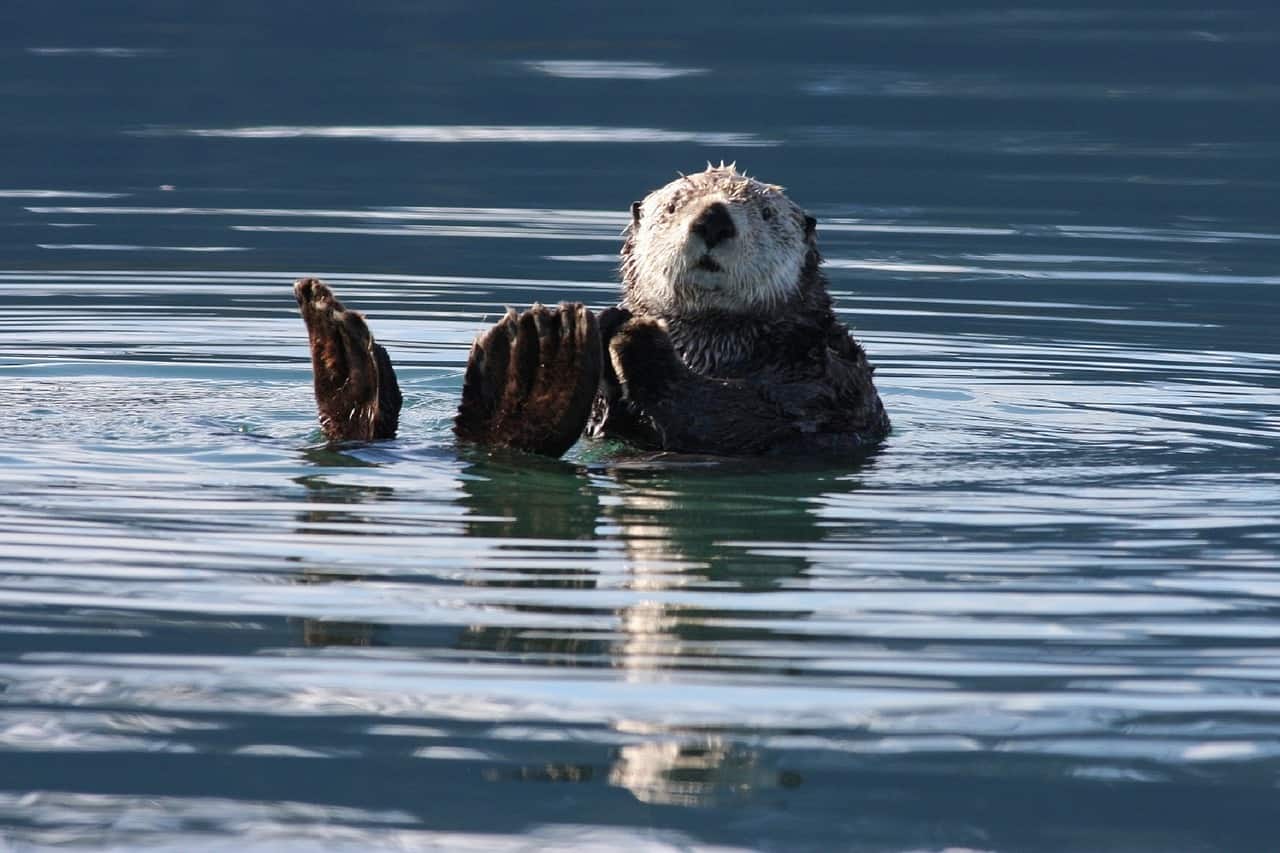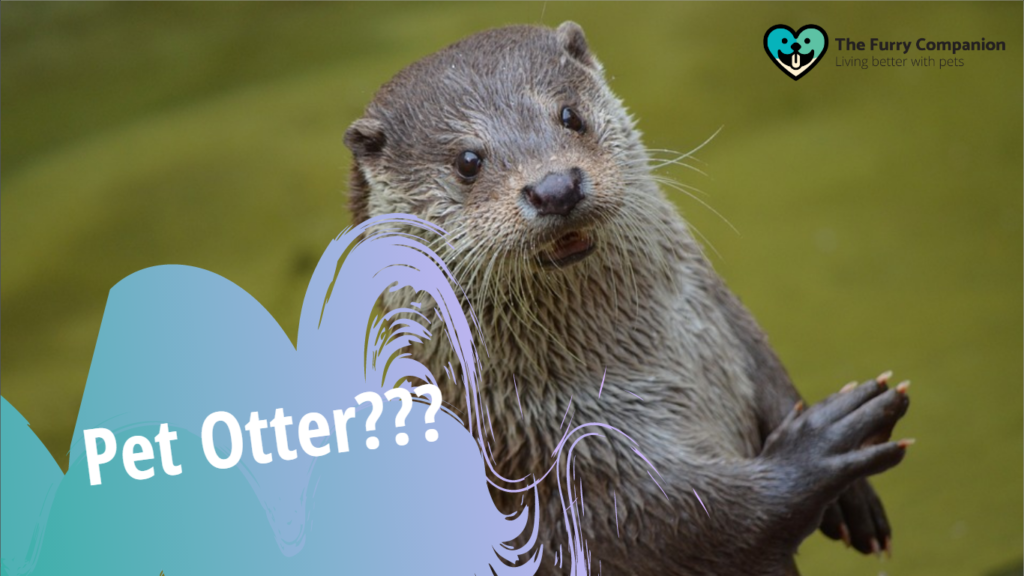If you are looking for an extremely exotic pet, your head must be spinning because of the number of them. Well, look no further because The Furry Companion has the cutest exotic pet for you. Becoming all the rage in Japan, this fascinating animal has outdone mischievous owls, ancient tortoises, and sugar gliders in popularity. It’s the slick and energetic pet otter!
Of course, we want both pets and owners to get along. At the end of this FAQs, you will know whether you are meant to be an otter owner or an otter disappointment (pun intended). As you go through this article, feel free to tick off the ways you think you can keep your otter happy.
Table of Contents
What Is An Otter?
If you are not so familiar with otters, that is okay. We have all seen otters with their tubular brown bodies covered in two layers of thick fur. Otters have beady eyes atop their tiny noses sprinkled with long whiskers. As part of the mustelid family, they are the cousins of weasels, badgers, and minks.
These creatures have only 13 extant species across the globe. Due to hunting, poaching, and habitat destruction, some otter species are endangered or at least threatened.
Can Otters Become Pets?
Out of the 13 otter species, only Asian small-clawed otters are legal to make pets in some parts of the world. These species have partially webbed paws, making them the most agile otters.
Another reason why this species is open to domestication is their size. Asian small-clawed otters are the smallest otter. They thrive in freshwater wetlands located in Southern Asia.
Due to poaching and a dwindling population, animal protection agencies and government groups worldwide have issued guidelines when owning such exotic creatures. These guidelines pertain to their care and upkeep. Captive otters are strictly for rehabilitation and educational purposes only. Owning native otters is illegal in several countries like the UK, Japan, and the United States.
They are wildly popular in Asian countries like Japan, Thailand, and Malaysia. Asian small-clawed otters, specifically, are adopted by households and made pets. However, since otters are family animals, animal cafes featuring otters are becoming tourist sites.
How Do You Build a Connection with Your Pet Otter?
Building a connection with a pet is essential. The more you relate to your pet, the stronger your bond will be. To know whether you will have a strong relationship with your pet otter, here are a few questions to ask.
Are you a big hand-holder?
Nobody can resist these cute otters acting clingy online. Famous for their hand-holding photos spread across the internet, otter pups have tiny paws as small as an adult human’s fingernail.
It may appear like a gimmick to get attention, but it is a survival technique. Sea otters hold hands when they sleep because it keeps them from drifting apart from each other. Usually, a mother otter holds her pup’s hand to keep them close to each other. Another technique is anchoring themselves by wrapping a line of kelp attached to the ground around their bodies. A pet otter is quite resourceful as much as it is clingy.
Do you often show your affection?
The otter cuteness overload does not stop at hand-holding! Otters are extremely affectionate toward their kind. They are often found kissing and cuddling with one another. The number of adorable otter photos and videos online is ridiculous!
Are you sociable?
Otters are social animals. Even in captivity, their dens are not for one single otter but a bevy (or a group of otters). A pet otter needs at least one other otter to keep it company, especially when in captivity; otherwise, it will lead a lonely life. If you are the type that is close to your family, then that is one more thing you will have in common with your pet otter.
Do you like to drink and play in the water?
Otters are semi-aquatic creatures and spend the majority of their time in the water. They like swimming and splashing in rivers, but they also come up to land. Otters have fast metabolisms, thus requiring them to drink a lot of water every day. If you like swimming as much as walking on land, then a pet otter could be your best friend.
Are you a playful and energetic pet owner?
It is no secret that these animals are otterly fun to play with. These furballs are full of energy. They like to play and scurry around the whole place. Their sleek fur makes it impossible to take a selfie with them, so do not expect a still family photo.
Remember, owning a pet otter requires that you be an equally charged ball of energy. Otters use 22 noises to communicate with each other and humans. When you visit a pen filled with otters, expect a warm greeting of shrill calls and loud beckons from the bevy. Dr. Laurie Hess, DVM, Diplomate ABVP says that “Exotic pets are fascinating. With their unique behaviors and complicated social interactions, both with each other and with us, they really can teach us all sorts of new information. “
Are you okay with a territorial pet otter?
At times, this energy makes them uncontrollably excited that they occasionally end up biting strangers or guests. People should be careful of their sharp teeth because otters do tend to bite. Otters are territorial creatures and act with much aggression as strangers invade their space.
Even a tame pet otter is capable of hurting or biting other people. Their behavior is just too unpredictable. So practice extra caution when you have guests around your pet otter.
Are you fond of cleaning?
Numerous otter owners can attest that a pet otter is not the most hygienic roommate. Since otters have fast metabolisms, they fill up their litter box within half a day. Owners must be ready to change and clean their litter boxes daily. This chore is a must-do, of course, if the pet otter is not potty-trained. Otter owners find it difficult to potty-train these mess makers because they will do their business anywhere! Beware of the otter droppings, one of the reasons not to have them.
Otter excrements are just one aspect of their being mess makers. These furballs can cause quite a ruckus. Gifted with restless claws and sharp teeth, leaving your pet otter unattended can result in a mess of a place. They tend to scratch furniture and tear pillows. Owners reprimand them for their bad behavior, but with irresistible purrs and cuddles, who can stay mad at them?
How Do You Take Care of a Pet Otter?
Now that we have our otter-connection set up, it is time to determine how much work is involved in living with a pet otter. As we have said, otters need healthy and livable environments to thrive. Here is the breakdown of pet otter care tips.
Otter Food
Otters are predatory animals, and their diets consist of other animals. They often hunt for food during their regular swim. In the wild, they mostly feed on frogs and invertebrates. Therefore, domesticated otters need ample time to hunt for their food aside from the regular dead meat they feed on. One pet otter needs at least 350 grams of food each day.
Experts suggest feeding your pet otter with a 70–80% meat diet consist of day-old chicks, chicken, and rabbits. The remaining 20–30% should be fish. “If otters are fed 30% of their body weight each day they tend to get fat; 25% of their body weight seems to be an ideal feeding level. This worked out to a total of 12 lbs. of food each per day which consisted of 8-9 lbs. of rockfish fillets, 2-4 lbs of squid and crab and snacks of sea urchins and clams,” Tag A. Gornall, DVM adds. Allow these creatures to take a dip and catch their prey. By doing this, you enable them to act on their instinct that they cannot live without. Besides, dead meat is not so fun to eat. Otters are after the chase!
Otter-Proofing Your Home
We have already established that no piece of furniture is safe from an otter’s claws. There is not much you can do to otter-proof your house. You may take the risk of letting them loose inside your home, but otters require a space identical to their habitat.
If you are willing to risk it, a comfortable pet mat can lessen the damage your otter can do. You may place it on your tamed otter’s favorite piece of furniture, like a couch or a chair. We have warned you—housing an otter may take a lot of work and investment.
The best move to house your pet otter is to give them a haven of their own. An otter haven should have a considerable amount of land and water in the enclosure.
Otters are fond of burrowing underground, and the terrain must be right for these creatures. Not only that, but the ground must also be particularly deep. Rooted in the otter haven are ample trees and branches to scavenge.
A pet otter requires as much space as possible. With their handy claws, they are capable of digging or climbing out of their enclosures. In our pet otter’s cage, we must prepare a sturdy fence that reaches in-ground as well. It is best to cap off the pen with a horizontal ledge. According to Michael Murray, DVM and co-authors, “Sea otters are capable of opening doors with standard doorknobs. Door handles should be placed out of the reach of the otters at a minimum of 1.5 m (5 ft) high or a secondary dead bolt or latch should be secured at a minimum height of 1.5 m.” To make the space homier, best install high walkways, natural hedges, and comfortable nesting places for them to dig and forage.
What makes their tailor-fit area more challenging to build and maintain is the waterscape which should comprise 30% of the space. A bespoke pool for otters to enjoy and bathe in is essential. Maintaining the temperature of the water in their mini-forest at 75 to 85°F is a must.
Depending on your country’s climate, caretakers must keep the water temperature at a level that does not cultivate disease-causing bacteria. This pool needs regular cleaning because dirty and bacteria-ridden water pools are harmful to your pet otter.
Pet Otter Care
Like any other exotic animal, a pet otter requires special treatment by veterinarians with rare otter experience. You can expect that vets familiar with the health and well-being of a pet otter do not come cheap.
Otter Exercise and Entertainment
Your pet otter needs their minds stimulated and entertained so that they will not become restless and bored. Providing diverse enrichment activities for otters keeps them busy and on their active toes.
A challenging activity for your playful pet otter is placing food out of reach so that they need to work out how to get it down. Another idea is to provide food-dispensing devices to exercise your pet otter’s need to hunt and forage. Another activity to encourage foraging and hunting is scattering around feathers of a bird in their den.
Some domesticated otters are given toys to play with from time to time. A lot of pet otter owners have given rubber toys to their beloved pets. If your pet otter’s taste is not too fancy, a smooth rock will do.
The Verdict: Should You Aspire to Be a Pet Otter Owner?
Overall, a pet otter is an energetic and fun-loving animal. They are affectionate and, if domesticated long enough, can be trained to be your official cuddle buddies and taught new tricks. However, remember that these are exotic animals that need to be in their natural habitat. Pet otters require a particular outdoor space for them to frolic and wreak havoc.
We must not overlook the fact that a pet otter is a high-maintenance creature. Getting a pet otter for the heck of it and their cuteness is not a legitimate reason to keep them around. Relating to your pet otter and having genuine intentions of caring and providing for their clinginess and demands are just the bare minimum requirements in owning a pet otter.
The challenge of owning a pet otter is obtaining it. With illegal trafficking of these pups, people must be particularly careful with where they source their otters. A broker is often the go-to guy when securing a pet otter, but they are extremely rare to come by. Owners need to equip themselves with patience, energy, and conscientiousness to own these lovable creatures.
Pet otter owners need to prepare themselves for the challenging days to come, from finding a lawful otter broker to their care. If you have ticked everything on this list and think you are capable of being charged with a pet otter, then you are in for an otterly fun time. If you don’t believe otters are entirely for you, then that is just fine. Not everybody can handle an otter’s sass, clinginess, and energy.
FAQs
Is an otter a good pet?
How much do otters cost as pets?
What is the life span of an otter?
Are otters intelligent?
Do otters carry diseases?
Are otters aggressive?
Are otters like dogs?
Do otters eat snakes?
What are otters scared of?
Are otters friendly with humans?

